
I am not a funeral director. I wish to convey a lay person’s view of pertinent information about Jewish funerals with the hope that ha’chacham einov b’rosho (those who are wise take heed of the inevitable). Some feel it is tempting the malach hamavet to discuss death or funerals. You need to decide for yourself.
If, chas v’chalila, a dear one dies, what should you do? First, call your rabbi and contact a licensed funeral director.
Say death occurs at 10 p.m. and you wish to have kevura (burial) the next day; what needs to happen? Or, death occurs on a mid-winter Friday afternoon and you wish to have the burial before Shabbos. Now what?
I urge you to discuss the “process” and timing with your rabbi and with a licensed funeral director of your choice.
Here is a brief tutorial that may be helpful. Again, I am not a funeral director.
Note: In New Jersey, by law, funeral chapels may not deal with graves. Your synagogue may have plots. Cemeteries and other organizations may also have plots for sale.
There are three categories of funeral arrangements:
- 1. At needs. At the time of death, family members make arrangements. This involves several important decisions:
- 2. Choice of funeral chapel, cemetery, scheduling, choice of casket (aron), etc. Difficult decisions are made during a very stressful time. When family members have religious differences, conflicts can arise. Who’s in charge? Should we have burial in Israel? Will there be a kosher aron, tahara, tachrichim, and shmira? Should we buy more than one grave plot? Should the funeral be postponed so a child who is learning is Israel can attend? Clearly, it is beneficial to make decisions in advance without time pressure and stress.
- 3. Pre-needs. Prior to death, an individual and their family meet with a funeral director to make and document critical decisions. At the time of death decisions are reviewed and finalized. Payment is not required at this time. As past national commander of the Jewish War Veterans, I remind veterans that should they wish military honors, they should ensure that discharge papers are readily at hand so the funeral director can make the appropriate requests.
- 4. Pre-paid. Augmenting “pre-needs,” money for the funeral can be placed into a government-monitored trust fund. This may have financial benefits; discuss with your accountant. I suggest you shop around. (1) Do you relate well with the funeral director(s)? Do they understand your specific needs and concerns? (2) Will this funeral chapel meet your halachic requirements? For example, do they have the facilities to do a proper tahara? (3) Cost: Prices vary greatly among funeral chapels.
The Funeral ‘Process’; A Brief Overview:
Upon death, a funeral chapel must be selected and a licensed funeral director is notified.
* Note: If the deceased is out of state with the burial to take place in New Jersey, I suggest that you first contact a New Jersey funeral chapel to make all arrangements including the appropriate paperwork. If you first contact an out-of-state funeral chapel, you may pay additional fees.
Decisions are made (or previous decisions verified).
The licensed funeral director will arrange for the meit to be transported, for shmira and for a tahara. (A death certificate, a hospital release, a burial permit, etc., may be required.)
Grave(s) are purchased if required. Documentation of a previously purchased grave is required.
(Remember, funeral chapels do not sell grave plots.)
The funeral is scheduled.
* Note: Cemeteries determine their own operating hours. Some close on legal holidays. If the cemetery closes at 3 p.m. and circumstances require a 5 p.m. burial, be prepared to pay significant overtime.
The funeral takes place—at the chapel, at a synagogue or at the graveside.
Shiva is then observed.
Expenses:
The funeral chapel’s charges for professional services.
Transportation of the meit to the funeral chapel.
Death certificate and other legal paperwork.
Shmira
Sheltering. If the funeral is not on the same day, then the meit needs to be refrigerated.
A coffin (aron)
Tachrichim
Tahara. (In many communities, taharot are performed by the volunteers of a chevra kadisha organization.)
There is an additional charge for a chapel service or a synagogue service (rather than a graveside service).
Rabbi’s fees (if any). In many cases this is handled directly with the rabbi.
Cemetery charges (opening/closing the grave).
* Note: Burial in Israel involves additional arrangements and costs; a funeral director can help you plan for this.
While it may appear otherwise, most of the costs billed to the family by the funeral chapel are “pass-throughs.” For example, the cemetery may charge several thousand dollars to “open” a grave. The cemetery bills the funeral chapel, which advances the funds on behalf of the bereaved family. (The cemetery does not want to be in the “accounts receivable” business.) The funeral chapel pays for all funeral-related expenses “up front” on behalf of the family and then passes these through to the family without any markups.
Conclusion:
There should be only one overriding concept throughout, and that is kavod hameit.
Wishing you shanim rabot (many good years).
By Dr. Carl A. Singer
Carl Singer served in both active and reserve status for over 31 years, attaining the rank of colonel. He served as national commander of the Jewish War Veterans, America’s oldest veterans organization, from 2016-2017. Carl and his wife, Miriam, have been married for over 41 years and have three married sons and six grandchildren.










